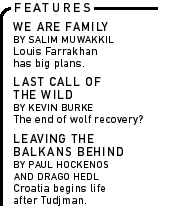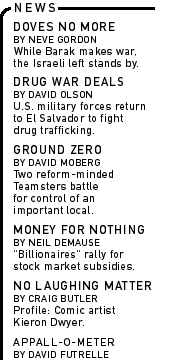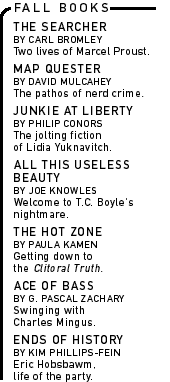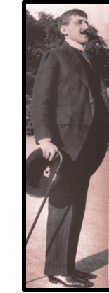
|

|

|

|
| |
|
|
|
Marcel Proust: A Life Marcel Proust: A Life From his redoubt on 102 Boulevard Haussmann, in a cork-lined bedroom closed to fresh air and light, full of notebooks and manuscripts, Marcel Proust confessed that shadow, silence and solitude obliged him to recreate in literature "the lights and music and thrills of nature and society." The "treasure house" of his memories was his oeuvre, and the reworking of the first half of his life became his second half. The result: his seven-volume masterpiece ╦ la recherche du temps perdu, rendered in English last century as Remembrance of Things Past; in this one, In Search of Lost Time. Nevertheless this severe asthmatic, and partial aphasic, occasionally would venture
He made nocturnal visits too, to Albert le Cuziat's male brothel and Turkish bath house--an enterprise Proust was rumored to have helped bankroll--where, for reasons of research, he watched through a small window as one of Cuziat's richest clients was "fastened to a wall with chains and padlocks" and whipped until he bled. Some nights, if we believe AndrÄ Gide, Proust would be more active, and was helped to orgasm by the squeal of caged, famished rats procured by Cuziat. Proust didn't scale rooftops or sneak through secret tunnels like his fictional contemporary, Irma Vep from Louis Feuillade's serial Les Vampires, but he was a virtual member of the living dead. Visitors to his pied-ł-terre would talk of his dull pallor and "two fine eyes burning with life and fever gleam." And even though he dreaded dying before finishing ╦ la recherche du temps perdu, he despised his own "odious existence" and, like a vampire craving real death, looked forward to dying. When he finished the last line, he told Celeste, his devoted housekeeper, "I have written the words 'The End.' Now I can die." But what an afterlife! As a very young man, Proust wrote that though we weep for the dead, "we still love them, and for a long while we are still under the irresistible spell of their charm that survives them and keeps us returning often to their graves." For nearly nine decades now we have been returning to Proust's grave, and as I write it seems the line of people paying their respects is getting longer. Every newspaper of record has written about a "Proust revival"; Proustian books on gardening, cooking and self-help are among us, and there's even a Proust comic book. British author Lisa Jardine, even though she credits Proust for inspiring her to become an historian, claims rather sniffily that the revival belongs to some sort of fin-de-siĆcle madness: "a fundamental failure of nerve at the beginning of a new era." What then would she--or even Proust?--think of a recent issue of Entertainment Weekly, where its editors declare that Proust, or Proust biographies, are "in"?
|


